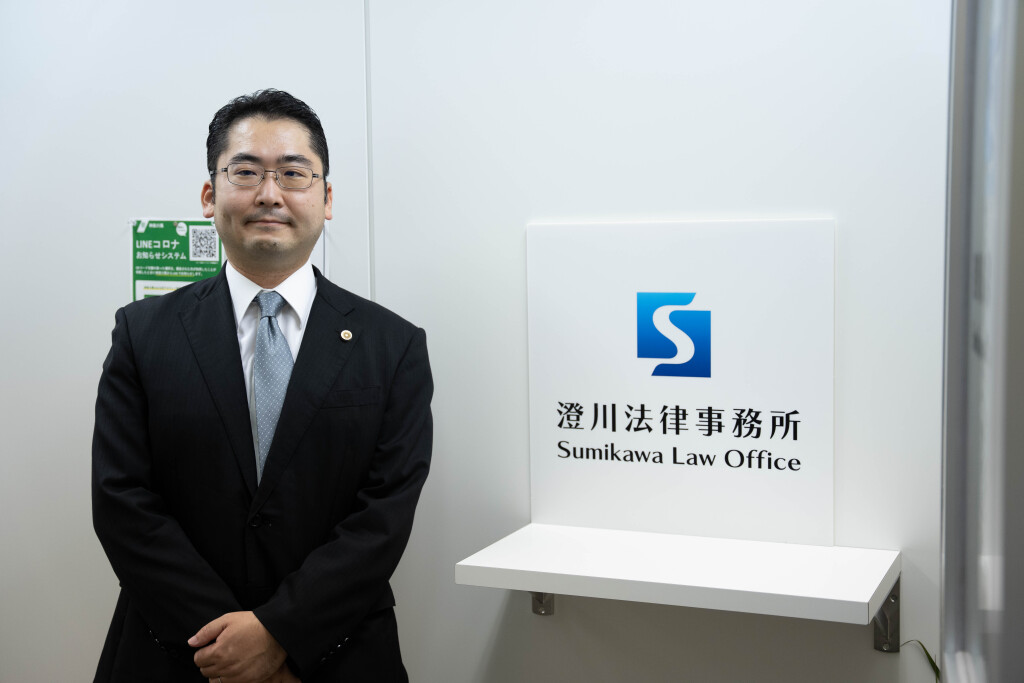- I understand your term as the Vice Chairman of the Kanagawa Bar Association ended this past March, but what did your duties entail? And how were you chosen for this role?
The Bar Association is a professional organization of lawyers that performs an array of duties (record keeping, hosting legal consultations, exchanges with other professional groups, committees, etc). The work of its key positions (chairman, vice chairman) involves enhancing cooperation and making decisions concerning the business affairs of its members.
Japan’s lawyers are required to register with their local bar association, so lawyers practicing in Kanagawa must all register with our prefectural office. Ultimately, lawyers operate independently and there’s no kind of chain-of-command relationship where association officers can dictate anything about the specifics of their business.

The vice chairman is selected through a formal voting process after announcing candidacy. When you assume the role of vice chairman, you’re expected to devote a large number of hours to the association, and you have a lot of influence over the operation of the main office. For these reasons, nobody volunteers without a sense of positive initiative. Generally speaking, their careers have progressed and they execute their duties as members of the bar with that same positive intent–it’s usually the case that such lawyers are encouraged by their peers to undertake this work. It’s often more of a selection than an election.
The role of vice chairman is for one year. It’s a short period, but I gained a wide variety of experience through all the decisions I had to make for the organization. I also had an excellent opportunity to meet quite a few people throughout the year.
- What are some new/cutting edge topics of law that you have to stay updated about?
The most important current topics involve corporate succession and related mergers and acquisitions (M&As). In Japan, the average age of those running medium and small businesses is growing older, and it’s said that in 2025 there will be close to 2.5 million people over the age of 70 running such businesses. Roughly half of these haven’t decided on a successor. So it’s necessary to implement M&A measures and succession plans–for the sake of regional economics as well. In the future I believe we’ll also see an increase in small-scale M&As whereby small and medium overseas businesses acquire small businesses in Japan.
- For a topic about Yokohama… The Carlos Ghosn/Greg Kelley cases at Nissan have brought Japanese law into the spotlight around the world. Obviously, we don’t know all the details of the case, but a lot of controversy surrounds it. In particular, many questioned the long period of detention without access to a lawyer while investigators attempted to obtain a confession. This seems like an extremely important topic because it’s something that affects both Japanese and foreign detainees alike. What’s your opinion of the matter?
Lacking information about this particular case, I can’t comment specifically on it, but the larger point is, as you said, an extremely important topic. There are a variety of problems with Japan’s criminal justice laws, including it being called “hostage justice”.
In Japan, judges often approve of long-term detentions, and in this situation, the detainees may be prohibited from contact with anyone outside detention, including family. The defense attorney is not restricted from meeting with the client, but he/she is not allowed to be present during the interrogation process.
One reason Japan’s criminal procedures have not undergone reform, though they have been criticized internationally, is that citizens and domestic media alike are indifferent to it. National rules are created according to laws and the Constitution so that authority can’t run rampant. Citizens and the media always need to pay attention to if those rules are followed and question if they remain appropriate according to the times. However, Japan has relatively good stability, and few have the experience of being arrested or having a family member arrested, so most find it difficult to relate to problems of criminal procedure. However, we are actually seeing some gradual positive change in the number of detention requests judges are rejecting due to the efforts of a great number of lawyers.
- Where are some (other) areas where Japan could improve its human rights laws?
Japan’s foreign population is low, and most people here have historically had little opportunity to interact with foreigners; even now, there’s just little to no awareness of racial discrimination. To offer a personal opinion, I think it’s very important to first create an environment where you can have international exchange on a local level. I think it would be great, too, if all international residents could obtain information at places like international exchange associations in the areas where they live, and participate in regional activities. Lastly, I think Japan has fallen woefully behind in gender equality.
- You deal a lot in the business world. What are some of the activities you are engaged in, and services you offer, that entrepreneurs and small business owners could take advantage of?
In Japan (and perhaps all countries are the same), everything is broken down into specialties. There’s law (contracts, negotiations, trials), taxes, registration, administrative procedures, social insurance and other fields of business operation that require special legal qualifications. All these various divisions might be hard for foreigners to grasp, but even my own firm fields requests for consultation for fields beyond our area of expertise (like taxes, for example).
In the business world, resolving legal problems, or even specialized problems beyond that, really needs a specialist who understands that specific aspect of business. However, when a problem arises and you go looking for a specialist, it’s not always the case that your problem is resolved because the specialist may not fully grasp some aspect of your business. It’s really important to have in place a specialist who you can regularly consult with (and, if possible, chat with over coffee or alcohol) about aspects of your business and more, so as to come up with measures for preventing trouble or appropriate responses when it does occur.
I’ve spent these past few years building a network of various specialists (accountant, judicial scrivener, administrative scrivener, labor and social security attorney) in the Tokyo and Kanagawa area. People can take advantage of not just lawyers, but other specialists in that network when necessary.
- Being a lawyer is a busy job. What do you do in your time off? What would you like to do when you retire?
Since my child is still young, I spend my weekends mostly at home. When my child is older, I’d like to go with my family to ski resorts and places like that. My job is fulfilling and there’s no age limit on practicing law, so I haven’t really thought about what I’ll do when I retire. But when I do, I still want to be involved in a variety of activities that contribute to regional development.


